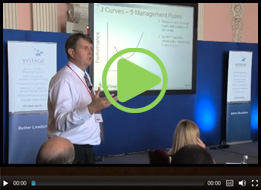
If I were to ask you the following question, what would your response be?
When something goes wrong in business, does it typically result from poor strategy or poor execution?
From my experience, there’s a ten to one ratio between these two.
And as you probably already know, the answer is poor execution. It’s a serious issue with many companies, so much so that there’s a saying that poor execution eats strategy for lunch; it doesn’t matter how great your strategy is, if your team doesn’t execute, then it all falls apart.
So why is it so common that execution is inevitably compromised?
It’s compromised when you fail to have two things:
- Accountability
- Responsibility
Establishing Accountability
In every turnaround consulting project that I performed earlier in my career, the first thing I focused on was instilling a culture of accountability. Without it, the turnaround was doomed.
As a turn-around consultant, I had a license to change things. Moreover, I had a responsibility to change things. Without change, the company would go broke. So people listened.
To begin creating the culture, I implemented what I call Integrated 3W Accountability. It’s a concept so simple that on the surface, many of you will dismiss it, or worse, you will think that you are currently doing it. And you may well be, but the vast majority of businesses that I have worked with are not.
Integrated 3W Accountability is the concept that every action has to have a what, a who and a when. That’s it.
Not very complicated, right?
As with many of the concepts I’ve implemented, it is not how simple it is, it’s how effectively you implement it.
Creating the Culture
The first action I would take was to bring together the leadership team for an open planning session. I’d kick off the session with a conversation about the positive – what are the things that we do well? What have we got here that’s worth saving? Then I would recognize that there were some things that were not done well, otherwise, we wouldn’t be in this position. But my focus now is about how we could do those things better in the future. It was important that we kept the conversation positive, even when we were talking about business weaknesses.
At the end of that conversation, the walls were always covered with flip-chart paper filled with a surprising number of great ideas!
After the meeting, I introduced the Integrated 3W Accountability concept. It’s easy to explain, but also very easy to fail to execute. Why is that?
- Some people will sandbag
- Some people will say that they’re too busy
Here’s the process I used to prevent this from happening:
- Have the team select five ‘whats’ that are going to be easy for people to commit to.
- Allow each person to define the when. This is important – allow them to own it! Do not override it unless there are extremely unusual circumstances.
- Clearly establish the non-negotiable rule that one of two things must happen by the when: Firstly, and preferably, you complete the action. If for some reason you cannot complete the action by the deadline, contact me beforehand and request an extension. What is not accepted is to sail through the deadline because you are too busy.
- Strictly enforce rule #3!
There will always be some people who will think that the rules don’t apply to them and will allow the deadline pass without completing the task or requesting an extension. Hold them accountable or let them go.
If you do not, the whole thing falls apart.
Enforcing rule #3 is the key. Do this, and you will begin to create the foundation for a “Culture of Accountability.”
Video
Nick Setchell's Top 5 Tips to Improve Your Business
This session combines all the powerful and popular concepts of Fiscal Focus with other concepts to assist you manage your people, market, and foundation values.


